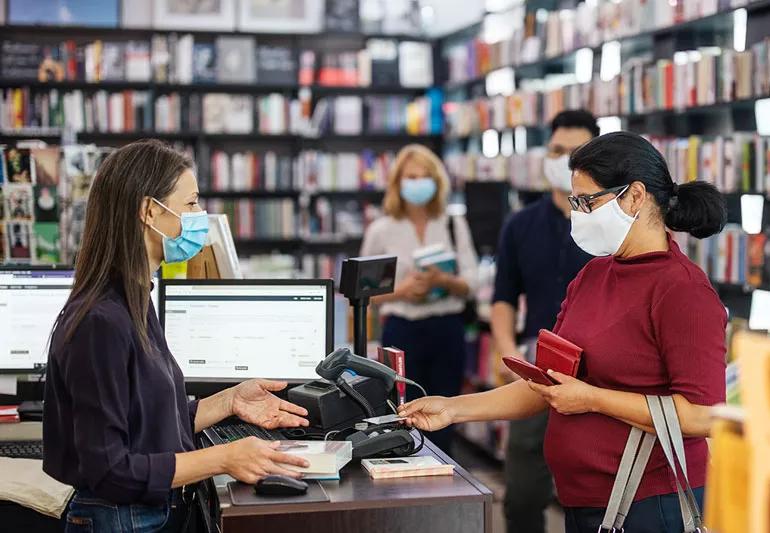What to know about masks and the delta variant

Image content: This image is available to view online.
View image online (https://assets.clevelandclinic.org/transform/8b64f089-c830-4d58-bb71-0fb19af9f775/deltaCovidGuidelines-1280181486-770x533-1_jpg)
covid masking social distancing vaccine
As COVID-19 cases have once again exploded across the country — fueled by the highly contagious delta variant — the CDC is rolling out new guidance about the need for everyone, including vaccinated individuals, to wear masks.
Advertisement
Cleveland Clinic is a non-profit academic medical center. Advertising on our site helps support our mission. We do not endorse non-Cleveland Clinic products or services. Policy
To get a clear idea of where we currently stand and the best path forward, we talked with infectious disease expert Kristin Englund, MD, about the new mask guidelines, breakthrough cases and the best approach to staying safe and protected.
Right now, according to Dr. Englund, the CDC recommends that everyone wear a mask indoors – regardless of vaccination status – in “areas of substantial and high transmission” of COVID-19.
Based on the current rapid rate new cases are spreading fueled by the delta variant, the guidelines could soon expand to a much wider area, if not the entire country. “New data indicates that we could soon go back to much broader guidelines that might be similar to 2020 when universal masking was ongoing in every situation,” Dr. Englund says.
Even if you don’t currently live in a high-risk area, she says, it’s still important to be vigilant and consider your personal risk. “Have you been vaccinated? Are you vaccinated but immunocompromised or live with someone who is? Do you have children who are too young to be vaccinated? These are the questions you have to ask yourself so you can assess the risk not just for you but for your loved ones.”
“Everyone should assume that their county will be an area of substantial and high transmission sooner rather than later,” she adds.
Advertisement
A new CDC report released on July 30 examined an outbreak in a Massachusetts community over the course of several public events throughout the month in July. The data showed that 90% of those cases were from the delta variant and that viral loads were similar in both infected vaccinated and unvaccinated individuals.
In other words, says Dr. Englund, vaccinated people who still become infected (breakthrough cases) are just as likely to spread the virus as unvaccinated people. “With the original strain of COVID-19, we saw a replication quotient of R2. That means every person infected with the virus could infect two people,” she notes. “The replication quotient for the delta variant is R8, meaning an infected person could spread the virus to as many as eight other people.”
Still, she adds, the risk of severe illness from breakthrough cases for vaccinated people remains low. “If you’re vaccinated, your risk of severe illness, hospitalization or death is at least 10 times lower than if you’re unvaccinated and become infected.”
“Masks are absolutely still an effective way to protect yourself from COVID-19, even with the delta variant,” says Dr. Englund. “We have learned over the last 18 months how beneficial masking is and there’s no reason to think it won’t be effective in at least slowing down the spread of the delta variant.”
But the best way to protect yourself, she adds, is to use multiple approaches. “Based on everything we know right now, no intervention is 100% effective. The best we can do is use multiple, different ways to prevent acquiring and spreading this very deadly disease,” she says.
“Masks, social distancing and, most importantly, getting fully vaccinated are all key to not just keeping yourself safe but your community safe, too,” she points out. “We need to employ every tool in our toolbox.”
Again, current CDC data suggests that vaccinated people are capable of spreading the delta variant even if they remain asymptomatic. That makes it even more important for everyone not to just get vaccinated but to do everything they can to curb this spread.
“We’ve seen over the last number of months what happens in a community when not everyone gets vaccinated: there’s enough virus in our community to allow it to mutate and become a much more transmittable and contagious form,” says Dr. Englund. “It can certainly mutate again so we need to do something about it. Everybody needs to get on board and do everything they can to stop this disease from spreading.”
Advertisement

Sign up for our Health Essentials emails for expert guidance on nutrition, fitness, sleep, skin care and more.
Learn more about our editorial process.
Advertisement
The short answer: It’s complicated, but the basic care precautions still prevail, like washing your hands and isolating if you’re sick
They can feel like a typical headache or a migraine headache, but the pain can last for weeks to months
Any large social gathering — from a family birthday party to an indoor music concert — has the potential to spread serious infection
It’s important to connect with a healthcare provider, get quality sleep and balance your activities with your energy levels
Just like the flu, COVID-19 will continue to evolve every year
The duration varies, but symptoms can linger for a few days up to a couple weeks or more
Vaccination is best for prevention, but if you get sick with COVID-19, treatments are available
The virus lives best in humans, but it can last on hard surfaces, like doorknobs and railings
Type 2 diabetes isn’t inevitable with these dietary changes
Applying a hot or cold compress can help with pain
Pump up your iron intake with foods like tuna, tofu and turkey